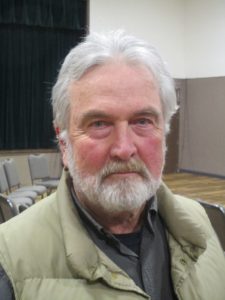
By QUINTON SMITH/YachatsNews.com
A Yachats commission tasked with oversight of the Little Log Church and Museum wants to see more information and involvement from the museum board to make it more comfortable with recommending the city spend $300,000 to replace the church.
The frustration surfaced at the end of a Yachats Parks and Commons Commission meeting last week as the group worked on capital improvement recommendations to the city Finance Committee.
“It’s standing. It hasn’t been condemned,” said commission chair John Purcell. “But if Parks and Commons is being charged with recommending or commenting on a teardown or reconstruction we need more input (from the museum board) and evidence that there is community support.”
In an interview with YachatsNews.com on Monday, three museum board members expressed surprise at commissioner’s comments, said there had been little to no communication in more than a month, and that they weren’t clear on the city’s expectations.
“We don’t want to create a contentious situation,” said Karl Christianson, chair of the museum board. “We do want to reach out more to the community.”
The city has owned the museum and church since 1986, but its operations via volunteers and a museum board were largely autonomous. The city normally budgets $10,000 for its yearly operations and the museum and church collects $3,000 a year in donations and rents.
But that changed in the past year as the city began to address myriad issues with its buildings. Part of that effort moved oversight of the museum from the City Council to the Parks and Commons Commission.
Examinations by an architect and an engineer found that much of the church’s log siding is rotten. Plywood covering some logs or walls was not caulked or sealed, letting water seep into the building. Some log siding has rotted through to interior sheetrock, there is dry rot in many walls, rotten exterior window trim and the church has a deteriorating post-and-beam foundation that should be replaced.
A year ago the city put $150,000 in its capital improvement budget as part of a two-year $300,000 program to repair or replace the church. But it has spent only a fraction of that this year for the engineering study and small repairs.
Under pressure from the city to do something, the museum board voted last month to endorse a plan to replace the 850-square-foot church – the museum is fine – with an exact replica.
But the estimated $300,000 price tag has drawn questions from the commission and others if the museum board should be responsible for raising some of the money. A similarly priced expansion of the volunteer-run but city-owned library is only using $60,000 in city funds with the rest coming from a large bequest, grants and donations to the library’s nonprofit foundation.

Parks and Commons Commission members said last week they want to get monthly reports on the museum’s operation and hear from its board if it will commit to raising a portion of the $300,000.
“It’s got to be a partnership …” Purcell said.
Commissioners Craig Berdie, Michael Hempen and Linda Johnson all said they want monthly reports on the number of museum visitors, volunteer hours, donations and rental income – and a board commitment to fundraising.
Commissioner Dean Schrock went even farther, suggesting an advisory vote by Yachats residents.
“Put it to a vote of the city,” he said. “Is this what the taxpayers would want to do with their money?”
On Monday, three members of the museum board – Christianson, Leon Sterner and Eric Bigler — told YachatsNews.com they were startled by the tone of the commissioners’ comments. They also said they hadn’t had a follow up meeting with the commission since its March vote on what the museum board might be asked to do.
Christianson said the board, with the help of city facilities manager Heather Hoen, is meeting with the Yachats Ladies Club and Lions Club to explain the church’s situation and solicit fundraising ideas. Sterner said others in the community have offered to help.
“But big fundraising? We’re not capable of that,” Christianson said.
“We’re a ‘Mom and Pop’ operation. We’ve always operated that way,” he said. “Things are changing, that’s obvious. We have to know what’s expected of us and if it’s realistic. And then we have to react to that.”




